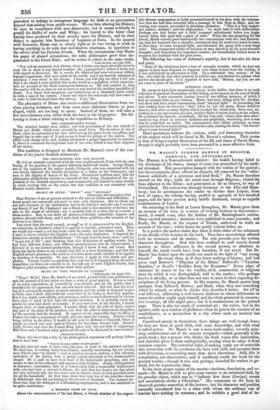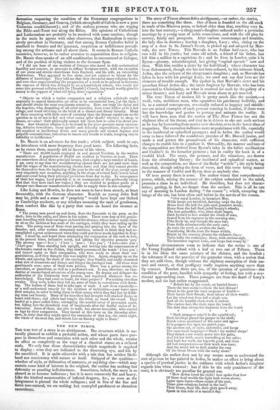DR. MASSIE'S SUMMER RAMBLE IN BELGIUM, GERMANY, AND SWITZERLAND.
Dn. MASSIE is a Nonconformist minister : his health having failed in the discharge of his duties, change of scene was prescribed by his medi- cal attendant. This prescription jumped with the wishes of the patient ; but the res angusta dami offered an obstacle, till removed by the "affec- tionate solicitude of a generous and kind flock." Dr. Massie therefore started on his trip ; made the usual tour through Belgium; visited the Spas adjacent to the Rhine ; and penetrated as far as Geneva, by way of Switzerland. His return was through Germany to the Elbe and Ham- burg; but he accompanies the reader• no further than Leipsic, from lack of space; the volume having swelled to upwards of five hundred pages, and the latter portion being briefly disthissed, except as regards reminiscences of Luther.
On returning to his flock at Lower Broughton, Dr. Massie gave them an account of his tour, in a series of evening lectures or discourses— much, it would seem, after the fashion of Mr. Buckingham's soirees. These excited attention ; abstracts were published in some journals ; and finally, Dr. Massie, at the request of friends, undertook to write an account of his tour ; which forms the portly volume before us.
In a preface the author states that there is little either of the substance or the details of his lectures in the book. They have nevertheless affected both its structure and its matter. The oral prevails over the written character throughout. Had this been confined to such merely formal matters as direct addresses in the second person, or allusions to himself, the result would have been harmless, if not novel. But Dr. Massie has looked upon the public too much in the light of "my young friends." He treats them as if they knew nothing of history, and had never read Bnlwer's "Pilgrims of the Rhine," Talfourd's "Vacation Rambles," or Head's "Bubbles from the Brunnens." Every place of eminence he comes to has the warlike, civil, commercial, or religions story for which it was distinguished, told to the reader ; who perhaps knows it already, or at least does not care to meet it when expecting de- scriptions of the living present. In like manner, Dr. Massie quotes long passages from Tabard, Bulwer, and Head, when they saw something which he missed, or when he thinks they describe it better. Set off by oral delivery, addressing a well-known audience to whose deficiencies or tastes the author might apply himself, and the whole presented in consecu- tive evenings, all this might pass ; but it is cumbersome on the printed page. There is also too much of oratorical art : the writer, lost in the speaker, calls up a combat of gladiators when he gets to the remains of an amphitheatre, or a martyrdom in a city where such an incident has occurred.
Considered merely in themselves, these things are well enough done;
for they are done in good faith, with some knowledge, and with what is called power. Dr. Massie is not a mere book-maker, covertly spin- ning reminiscences out of the nearest receptacle—which generally is the guide-book; but a person who thinks his flock wants this instruction, and therefore gives it them undisobmisedly, owning when he takes it from common sources. The oratorical habit of making ready use of materials also serves him well : he condenses his facts with skill, and presents them Wills cleverness, or something more than mere cleverness. Still, this is compilation, not observation ; and it needlessly swells the book for the general reader,—though it was not, perhaps, intended for readers in ge- neral, but for a particular class.
In the more proper topics of the tourist—incident, description, and re- mark—Dr. Massie is able to give some variety to an exhausted field, by his peculiar object, which was to "indicate how these (foreign) scenes and associations strike a Christian." His comments on the facts he observed partake somewhat of the lecture • but his character and position naturally introduced him to a class with whom the ordinary run of tourists have nothing in common; and he exhibits a good deal of in.
formation respecting the condition of the Protestant congregations in Belgium, Germany, and Geneva, (which stronghold of Calvin is now a pure Unitarian establishment); and of the zealous persons who are waging the Bible-and-Tract war along the Rhine. His opinions of Catholicism and Lutheranism are probably to be received with some caution; though in the main he agrees with other observers, that Rationalism is exten- sively prevalent in Germany, and that among Roman Catholics belief is confined to females and the ignorant, scepticism or indifference prevail- ing among the artisans and all above them. It seems in Roman Catholic countries, however, to be rather aversion to superstition than to religion. Dr. Massie thus speaks of an odd combination he encountered at Cologne, and of the position of dying visiters to the German Spas. •
"I did not hear of one resident of Cologne who dared to defy ecclesiastical hostility and censure, in attempts to diffuse Scripture truth, with the exception of one pions and erratic churchman from England, and his wife, an interesting Irishwoman. They appeared to live alone; and yet rejoiced to labour for the diffusion of knowledge. They told me that they circulated many religious books, and were then superintending the preparation of a work to be printed in German; the expense of which was defrayed by an acknowledged atheist, who would not come into personal collision with the [Romish] Church, but would readily give his money to the support of what will bring down superstition."
• •
"Objects on which a tender compassion and a religious solicitude ought anxiously to expend themselves are often to be encountered here, [at the Spas,1 and should obtain the most considerate attention. Here are truly the dying and the hopeless, who, despairing of all other remedies, have come hither as to a last refuge, and stand shivering on the brink of a dismal and dreary futurity. Many of them reasoning with little more of certainty than the Roman republican on the question to be or not to bet and what comes after death? whether to sleep, to d -rum, or—alas ! their philosophy cannot tell them how to solve this dread pro- blem- And whatever religion is to be found in the place presents many unmean- ing, delusive formalities; many ignoble and debasing superstitions, repulsive to the sceptical or intellectual mind; and many puerile and absurd dogmas and palpable contradictions, ridiculous to reason and hostile to truth, tempting only to infidelity or indifference."
Dr. Massie is an advocate for free trade which subject, Booth to say, he introduces with more frequency than good taste. The following facts, as he states them, scarcely tell in favour of his views.
"There are 40,000 hands employed in and around Verviers, in the woollen manufacture. A population of 20,000 are resident in Verviers at least. There are somewhere about three principal houses, that employ a large number of hands. I am sorry to say that the manufacturing classes there are not paid more than half the wages of the manufacturing classes here; and that they cannot provide for themselves from the beginning of the year to the end of the year, except upon very singularly rare occasions, anything in the shape of animal food; brown bread and sour-crout being their principal provisions from day to day. In consequence of their low wages, (and probably it is in consequence of the professedly cheap food that they have such low wages,) they are enabled to produce goods at a cheaper rate than our manufacturers are able to supply them in this country."
Like Laing and Howitt, he does not seem to have been struck, at least favourably, with the German character. Bearish as young John Bull may be, pride and a sense of " propriety " would have kept our Oxford or Cambridge students or any scholars assuming the rank of gentlemen, from conduct like this by a party that came on board the steamer at Bonn.
"The young men paced up and down, from the forecastle to the poop, on the deck; here in the cabin, and there in the saloon. There were four or five gentle- men travelling with their carriages on board the steamer, whose ladies' maids chose to sit on the dickies or box-seats of the carriages, whilst they were sailing up the river. The young men of Bonn went peering and peeping into the faces of the females; and, after various elementary exercises, seemed to think they had ac- complished a great achievement when they could put three words together in Eng- lish. I stood by, and heard them attempting the conjugation of the verb to love, in the present tense, indicative mood, and adding the objective pronoun 'you.' The process was= love'; I love '; you'; love you '; 'I love—love you'; Wove you.' Then standing bolt upright, and looking into the countenances of the females seated on the dickies, they slowly pronounced the words 'I love you'; and turned again to their companions, who were ready to shout their con- gratulations, as if they thought this was mighty fine. Again, stepping up on the wheels, and opening the doors of the carriages, they frankly and coolly examined what sort of ornaments and linings and fringes the carriages had. All these were gentlemen's sons• some of them were princes. There was a prince among the custodiers, or guiirdians, as well as a professor's son. It was, therefore, no clan- destine or nnsanctioned adventure of the young men. By deputy and delegate the authorities of the University were present, and regulated whatever was ac- knowledged. They had come on board, for what purpose? For nothing else than revelry. They were, before they left us, some of them in convulsions with drink- ing. The leaders of them had to take care of such. I saw them repeatedly— as a well-understood remedy for the delirium of inebriation—pour water upon their temples, in order to bring them to their tenses, which they had lost by drink- ing wine and brandy. Many of the travellers had brought well-stocked flasks on board with them; and others had bought the drink on board the vessel. They landed at a place called Linz; attempting the martial array of procession again, but falling Into the disorderly rout of bacchanals after the fearful orgies of in- toxication. Some of them, not able to walk, but almost insensible, were carried as logs by their companions. They landed at this town on the Saturday after- noon, in order that they might spend the remainder of that day, the entire night, the whole of the next day, and return late on Sunday night to Bonn."



























 Previous page
Previous page